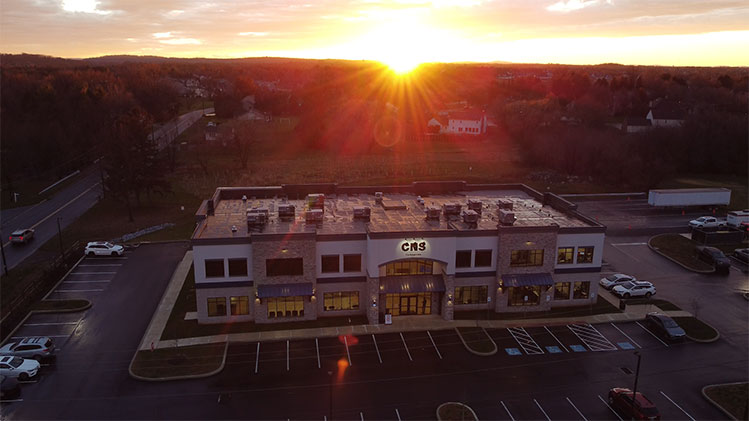Furry Friends Cause Trucking Border Delays At Canadian Border
To prevent reintroduction of rabies carried by dogs into the United States, new CDC regulations require proof of healthy pets at border crossing. Truckers who
We are a team of DOT Compliance and Licensing Professionals helping trucking and transportation companies remain safe, compliant, and profitable.
CNS or Compliance Navigation Specialists is DOT Compliance company that assists trucking and transportation companies remain DOT Compliant. We are part of a network of companies, CNS Companies, specializing in services related to the transportation, manufacturing, construction, service, education and medical industries.

A full-scale DOT Compliance Program managing a long haul carrier’s safety, compliance, licensing and more.
Learn more >>>
A DOT Compliance Program that keeps motor carriers compliant with the 6 Basic DOT Regulations required of all carriers.
Learn more >>>
Our Short-Haul/Construction Program is a full-scale program designed for private carriers that do not haul for-hire.
Learn more >>>
Our most comprehensive DOT Compliance Program, operating as your company’s off-site Safety Director or assisting your current safety personnel.
Learn more >>>
Our Non-CDL Program is a full-scale program managing safety, compliance, licensing and more for moving companies, couriers, landscapers, or any company subject to DOT regulations and does not employ CDL drivers.
Learn more >>>
Our DOT Audit Services cover a number of different types of DOT Audits that new and existing carriers will be subject to.
Our DOT Driver Services help trucking companies and carriers to stay compliant as they grow and hire more drivers.
Our DOT Vehicle Services focus on ensuring your vehicles are compliant with DOT Regulations, which is just as important as your drivers.
Our DOT Services for Special Carriers focus on companies outside of the typical motor carrier, like HAZMAT, Passenger and Bus Carriers.
CNS is part of a group of companies that offer other necessary services for the trucking and transportation industry, such as Commercial Trucking Insurance, CDL Training, Online Training Course, and even Healthcare.
Our DOT Licensing Services will cover you whether you are an existing company or just starting a trucking company. Our DOT Licensing Specialists can help you get up and running and in days with your DOT number, MC Authority, EIN, UCR, IFTA, 2290 HVUT, Fuel Taxes and can even set you up to get your Commercial Driver's License (CDL) with CNS Driver Training Center.
Our DOT Licensing Specialists will help you with every aspect of starting a trucking company. All you need to do is choose a name for your trucking company.
You will need to ensure your DOT Number, MC Authority, Vehicle Registration, etc. is all set up properly when you start your trucking business.
Our Licensing Specialists can help with all aspects of filing and renewing licenses, fuel taxes, etc.
CNS is part of a group of companies that offer other necessary services for the trucking and transportation industry, such as Commercial Trucking Insurance, CDL Training, Online Training Course, and even Healthcare.
To prevent reintroduction of rabies carried by dogs into the United States, new CDC regulations require proof of healthy pets at border crossing. Truckers who
CNS or Compliance Navigation Specialists is DOT Compliance company that assists trucking and transportation companies remain DOT Compliant. We are part of a network of companies, CNS Companies, specializing in services related to the transportation, manufacturing, construction, service, education and medical industries.
CNS Companies is a network of companies specializing in services related to the transportation, manufacturing, construction, service, education and medical industries. Our DOT Compliance division is handled by Compliance Navigation Specialists, CNS Insurance handles Commercial Truck Insurance, CDL training is managed by the CNS Driver Training Center and healthcare is managed by CNS Occupational Medicine.
We are a team of DOT Compliance and Licensing Professionals helping trucking and transportation companies remain safe, compliant, and profitable.
CNS or Compliance Navigation Specialists is DOT Compliance company that assists trucking and transportation companies remain DOT Compliant. We are part of a network of companies, CNS Companies, specializing in services related to the transportation, manufacturing, construction, service, education and medical industries.

A full-scale DOT Compliance Program managing a long haul carrier’s safety, compliance, licensing and more.
Learn more >>>
A DOT Compliance Program that keeps motor carriers compliant with the 6 Basic DOT Regulations required of all carriers.
Learn more >>>
Our Short-Haul/Construction Program is a full-scale program designed for private carriers that do not haul for-hire.
Learn more >>>
Our most comprehensive DOT Compliance Program, operating as your company’s off-site Safety Director or assisting your current safety personnel.
Learn more >>>
Our Non-CDL Program is a full-scale program managing safety, compliance, licensing and more for moving companies, couriers, landscapers, or any company subject to DOT regulations and does not employ CDL drivers.
Learn more >>>
Our DOT Audit Services cover a number of different types of DOT Audits that new and existing carriers will be subject to.
Our DOT Driver Services help trucking companies and carriers to stay compliant as they grow and hire more drivers.
Our DOT Vehicle Services focus on ensuring your vehicles are compliant with DOT Regulations, which is just as important as your drivers.
Our DOT Services for Special Carriers focus on companies outside of the typical motor carrier, like HAZMAT, Passenger and Bus Carriers.
CNS is part of a group of companies that offer other necessary services for the trucking and transportation industry, such as Commercial Trucking Insurance, CDL Training, Online Training Course, and even Healthcare.
Our DOT Licensing Services will cover you whether you are an existing company or just starting a trucking company. Our DOT Licensing Specialists can help you get up and running and in days with your DOT number, MC Authority, EIN, UCR, IFTA, 2290 HVUT, Fuel Taxes and can even set you up to get your Commercial Driver's License (CDL) with CNS Driver Training Center.
Our DOT Licensing Specialists will help you with every aspect of starting a trucking company. All you need to do is choose a name for your trucking company.
You will need to ensure your DOT Number, MC Authority, Vehicle Registration, etc. is all set up properly when you start your trucking business.
Our Licensing Specialists can help with all aspects of filing and renewing licenses, fuel taxes, etc.
CNS is part of a group of companies that offer other necessary services for the trucking and transportation industry, such as Commercial Trucking Insurance, CDL Training, Online Training Course, and even Healthcare.
To prevent reintroduction of rabies carried by dogs into the United States, new CDC regulations require proof of healthy pets at border crossing. Truckers who
CNS or Compliance Navigation Specialists is DOT Compliance company that assists trucking and transportation companies remain DOT Compliant. We are part of a network of companies, CNS Companies, specializing in services related to the transportation, manufacturing, construction, service, education and medical industries.
CNS Companies is a network of companies specializing in services related to the transportation, manufacturing, construction, service, education and medical industries. Our DOT Compliance division is handled by Compliance Navigation Specialists, CNS Insurance handles Commercial Truck Insurance, CDL training is managed by the CNS Driver Training Center and healthcare is managed by CNS Occupational Medicine.

‘‘Detention time’’ refers to the extra time commercial motor vehicle (CMV) operators wait at shipping and receiving facilities due to delays associated with the loading and unloading of cargo. Drivers are often not paid for this extra time.
Although there is currently no standard definition of detention time, the CMV industry have typically used dwell time, or the total amount of time spent at a facility, exceeding 2 hours to define when detention time occurs.
FMCSA is seeking a proposed study on “Impact of Driver Detention Time on Safety and Operations.” You can make a comment on this proposed study until Oct 23, 2023.
The study would collect data on commercial motor vehicle (CMV) driver detention time, analyze frequency and severity of detention time, and assess the utility of existing intelligent transportation systems (ITS) to measure detention time.
FMCSA estimates that approximately 80 carriers and 2,500 drivers will provide data in the study.
Why another Detention Time Study?
FMCSA completed a study in 2014 on the impact of detention time on CMV safety, but it had several limitations, including a small sample of mostly large carriers, a rudimentary estimation of detention time, the inability to identify time spent loading/ unloading, and data that did not cover an entire 12-month period.
Therefore, FMCSA needs additional data from a broader sample of carriers.
In 2021, drivers rated dwell time as their second-highest concern because:
This study is important as detention time often results in lost revenue for many drivers and carriers.
If we can reduce detention time, it may reduce costs for carriers, increase pay for drivers, and improve CMV drivers’ ability to make deliveries on time or arrive at a destination as planned without violating hours of service (HOS) requirements.
In fact, drivers who experience less detention time may be more likely to drive safely to reach their destinations within the HOS limits and less likely to operate beyond HOS limits and improperly log their driving and duty time to make deliveries on time.
The study will examine the relationship between detention time and safety outcomes during the shifts following the detention time as well as estimate the cost per year associated with detention time, including lost productivity, disruptions to the supply chain, and any increases in fatal, injury, and property damage-only crashes.
For the purposes of the study, FMCSA is considering any time spent at a shipping or receiving facility beyond two hours as detention time.
Data will be gathered using:
The carriers will be selected so that the sample is representative of the nation.
The final study sample will include up to 80 carriers with up to 2,500 total vehicles in a variety of carrier
operations, including long haul/short haul, private/company fleets and forhire fleets, port servicing (primarily chassis), owner-operators, hourly and mileage-based operators, truckload/lessthan-truckload, and dedicated local delivery.
After agreeing to participate, carriers will collect and provide one year of data.
The study will analyze the relationships between detention time and characteristics of carriers, facility locations, and driver schedules (appointment times, time of day, day of week, month, and season), FMCSA added.
Another analysis will examine the relationship between detention time and safety outcomes during the shifts following the detention time.
For more information, contact us at 888.260.9448 or info@cnsprotects.com.

Portland, OR ranked 19th for the worst congestion, which costs the average Portland driver $679 and the city $665 million in 2023, according to the

54% of 366,800 drivers are affected by the rule are not using ELDs now. This means nearly 200,000 vehicles will need a new ELD to

In May 2020, following the announced proposed Hours of Service rule changes, Commercial Vehicle Safety Alliance (CVSA) petitioned to update the definition of personal conveyance

With new HOS rules on the horizon, it is time to start training company drivers so they understand how their workday will improve. This week
Our DOT Compliance Programs ensure it is your top priority and keeps your business running.
Receive the latest transportation and trucking industry information about FMCSA and DOT Audits, Regulations, etc.

Portland, OR ranked 19th for the worst congestion, which costs the average Portland driver $679 and the city $665 million in 2023, according to the

54% of 366,800 drivers are affected by the rule are not using ELDs now. This means nearly 200,000 vehicles will need a new ELD to

In May 2020, following the announced proposed Hours of Service rule changes, Commercial Vehicle Safety Alliance (CVSA) petitioned to update the definition of personal conveyance
Join our monthly newsletter and stay up-to-date on trucking industry news and receive important compliance and licensing tips.
Join our monthly newsletter and stay up-to-date on trucking industry news and receive important compliance and licensing tips.